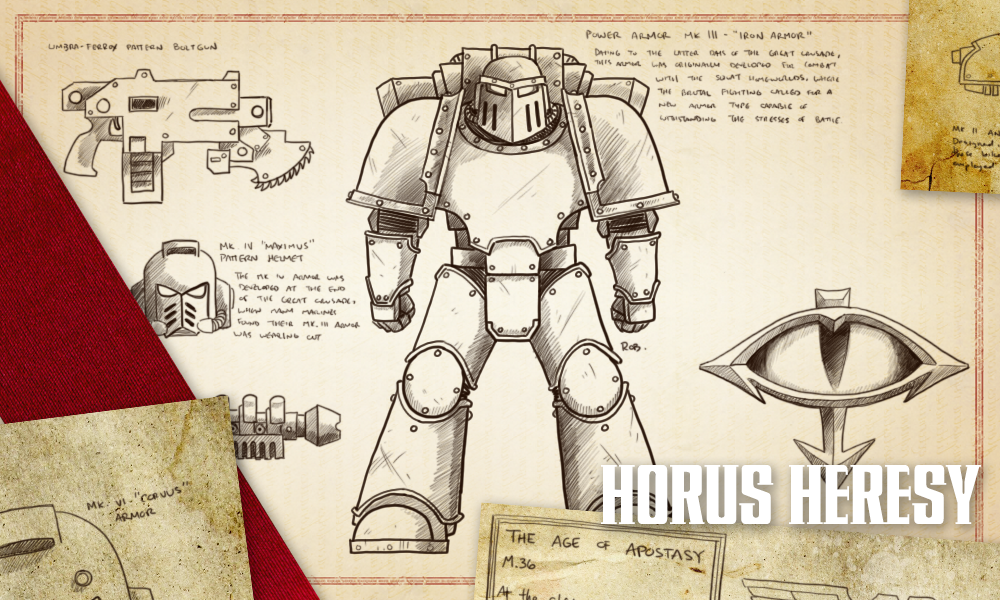Welcome to the Horus Heresy. With the release of the Age of Darkness and the second edition of the rules, there’s never been a better time to jump into (or return to) a world set 10,000 years before Warhammer 40,000. Over the next few weeks this series is going to take a look at how to build your army, and how those choices you make will affect you on the battlefield.
Between the Horus Heresy series and the Siege of Terra, the Black Library has spent the last 16 years cranking out 50 books, numerous audio dramas, innumerable short stories and a dozen collections telling the tale of the heresy, with an extremely variable hit rate. They go from genuinely good military SF through a wide range of solid Black Library fiction and into some that are best… left unread and unremembered.
During that bit of 2020 where we all suddenly had a lot of time on our hands, I read them all. Every single word the Harlequins have prised from the Black Library on the Heresy. Read! The dizzying highs! The furiously abyssal lows! The Garro-shaped middles.
This article covers the Traitor legions – look for the tragically deluded loyalists coming soon.
Opening The Black Library
A big part of building your Heresy army in this mock-historical Age of Darkness is in making them yours. Moreso than in any other mass battle Games Workshop property, the Horus Heresy tells a narrative – a galaxy wide tale of tragic betrayal and relentless corruption, the dawning of a grim and indeed dark age, but also on smaller scales, of friends turning into enemies, of moral codes crossed, or the billions of individual lives extinguished as humanity reached towards the Emperor’s vision. Doing Heresy is as much about narrative as it is about tuning your list or painting your models.
But forging that narrative is difficult, and it’s not all about “A” single narrative. This article is to help with that, flagging up where you can find inspiration for your narrative, the one you create for your army and your games. It’s a platter of lore cheeses served up by some fantastic authors – you can pick up whichever takes your fancy.
This article will highlight a couple of recommendations for you to find inspiration for your own Age of Darkness narratives from among the hundreds of thousands of pages put down on paper since Horus Rising was released in 2006.
Sons of Horus
The Sons of Horus are in a difficult narrative situation for much of the Heresy – the main bad guys, but rarely the protagonists. Horus himself spends a long time doing something (an imaginary Heresy Point if you can honestly tell me what he’s up to), and the Legion never really finds a unique voice after the high point of Horus Rising. If you can cope with wondering why Horus is being led around by that bastard Erebus, there’s a lot out there from everyone’s favourite soon-to-be-black Legion.
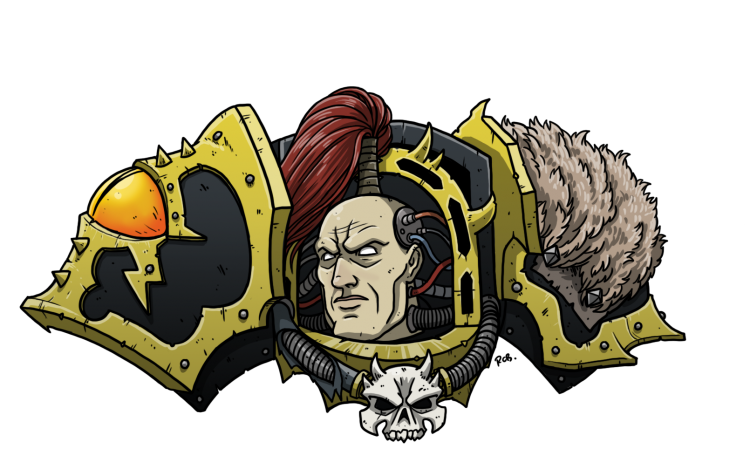
Horus Rising, Dan Abnett
The book that started it all! Almost entirely situated in Horus’ inner circle, Horus Rising these days doesn’t quite seem to fit into the Heresy, and doesn’t get to the Heresy itself. But it establishes the Luna Wolves as doing what they do best – unrelenting, merciless killers who do the job with a smile. Plus, you meet Loken, Torgaddon, Maloghurst and the big man himself (no, the real big man – Abaddon), before he was famous.
Vengeful Spirit, Graham McNeil
Sons of Horus hanging around on a weird Knight world and having a seemingly meaningless fight with an Imperator Titan seems like it’d be enough really. McNeil sets out to answer the question “how could Horus have a chance against the Emperor?” and does so in a mass of fun, slightly brainless bolter, titan and knight combat with Horus getting to throw down against demons, perpetuals and marines who lacked the courage to stand with him. Horus actually doing something is fairly rare in the Heresy series, so enjoy it while it lasts.
The Solar War, John French
The full Sons of Horus unleashed on the solar system. Has excellent bits of narrative potential in the near feral Newborns, in Horus Aximand kicking ass and taking names, and in Abaddon’s not-particularly-tragic backstory of why he’s such a complete arsehole. There’s hints here of what happened in the grim dark future, and Horus gets some of the best, comedically saturday-morning-cartoon villain lines of the entire series.
Emperor’s Children
Ok, lets get it out the way. One of the worst, self contradictory and weirdest, not in a good way – even in a good Slaaneshi way – bits of Heresy fluff is the Emperors Children and the Pear of Anguish (also known as “The Reflection Crack’d”), a supposedly medieval instrument of anal torture that most likely has never been used for that purpose. The Emperors Children haven’t been well served by Heresy fiction – but luckily Bile has his own novel series for those who desperately need more EC weirdness.
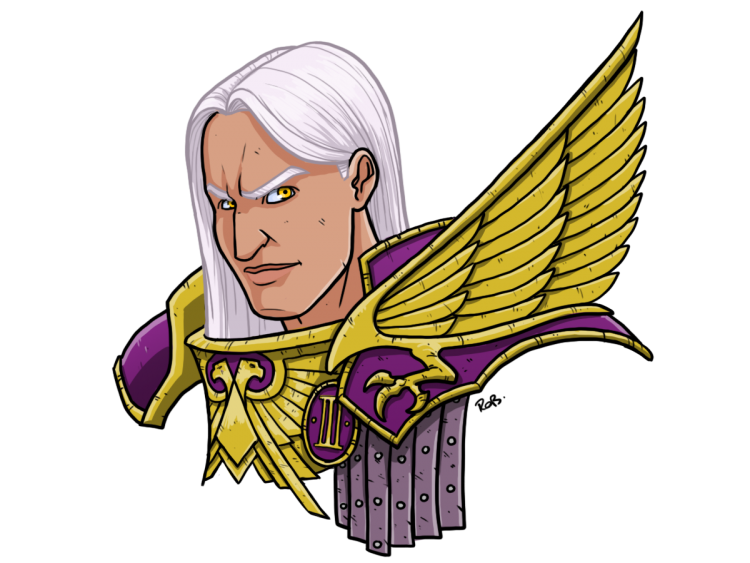
Fulgrim, Graham McNeil
Ok, got to be honest with you. This one is a real skub book – some people absolutely cannot stand it and one of the most positive descriptions is “it’s alright”. I am pretty sure I like it ironically, but there’s still something about it that makes it worth a go. It’s corny, it’s tacky, it contains the line “My Emperor’s children, what sweet music they make”, it’s got weird plots about sex and self harm which are unpleasant and occasionally offensive. It’s a 40k pastiche The Portrait of Dorian Gray, when Portrait is already a much better exploration of someone falling to Slaanesh. But I tell you what, If you want Noise Marines and Sculpture and Avatar-punching, Fulgrim has it.
Slaves to Darkness, John French
Ok, the Emperors Children aren’t the protagonists of this one – less perfect Sons of Horus, Iron Warriors and Word Bearers are – but the section where Lorgar goes to find Fulgrim is pretty funny, particularly if you know your High Elves lore. Here you get your Primarch in full Chaos Daemon mode, sharing strawberries with the Doom of Aenarion and being arch.
Chirugeon, Nick Kyme
I like Fabius Bile, for all that he’s probably one of the absolute worst bastards of the 40k world. He’s also a complete bastard in 30k as well, and this short story shows that he was rotten through to the core the entire bloody time.
Iron Warriors
I don’t think anyone’s managed to really nail Perturabo as yet, but then again he’s always had one of the worst backstories and really inconsistent characterisation. About as traumatic a childhood as my own, he grows into a teenage edgelord athiest and then generally obsessed with being overlooked despite no evidence of this being proffered in any source, turns traitor and tears down the palace because…… Hmmm. The Iron Warriors themselves though are generally pretty great, and there’s lots out there to cover the Sons of Olympia.
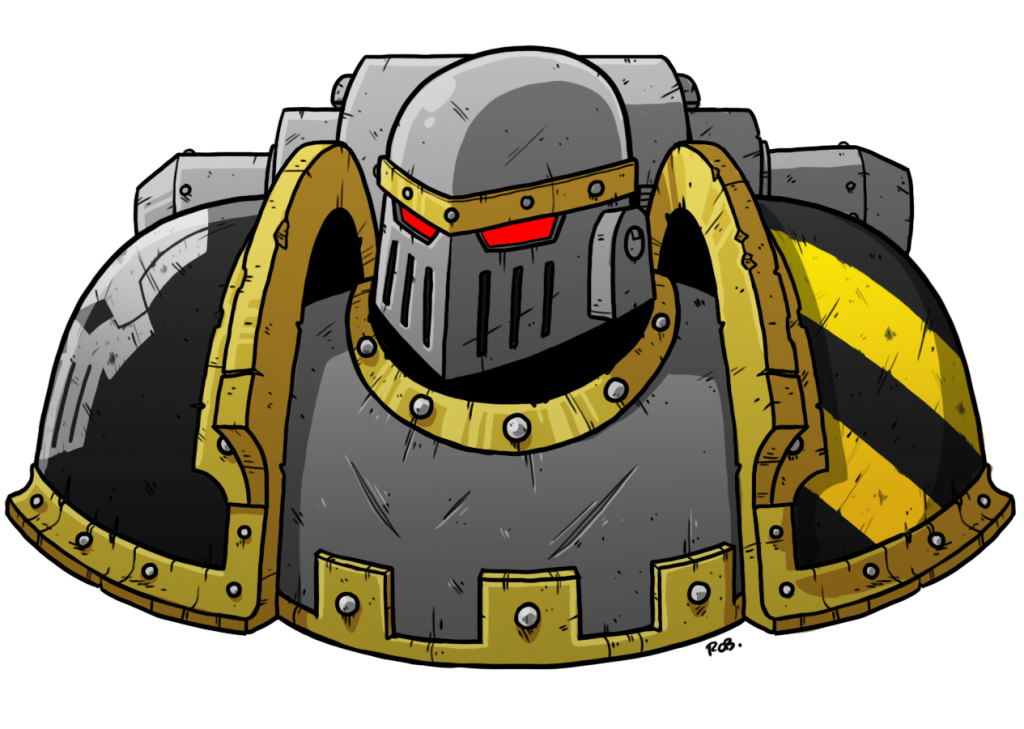
The Iron Within, Rob Sanders
The Idiot Krendl and the Chad Dantioch. Look, it’s about Loyalist Iron Warriors but this is my article, so there. The foundation of the best, grumpiest old man of the Heresy, with killer moments that almost make sense if you don’t look too hard and a slightly tangled chronology, this is among the best of the Heresy short stories full stop. The inverted fortress of Schadenhold with it’s endless layers of traps and murder holes, speaks better to the intricate bloodymindedness of the Iron Warriors than anything focused on their Primarch.
Ironfire, Rob Sanders
Ok, ok I included this one because it’s Krendl dealing with consequences of being an idiot when compared to Dantioch. It’s got the Iron Warriors coming up with insane strategies to marshall firepower where it’s needed, including the insanity of stealing and wielding Mechanicum Ordinatus to beseige a fairly unimportant planet. Read this is you want your Iron Warriors to just be able getting the largest of all possible guns.
The First Wall, Gav Thorpe
Chaos (literal and metaphorical) ensues when, confronted by the defences of Terra, Perturabo asks What If I attacked wrong, as a joke? Suddenly there’s a sprawling dirty war for the Lion’s Gate and the Iron Warriors are the only capable traitors in the whole damn siege. If you’re looking for Iron Warrior inspiration, the Legion runs the gamut from intricate clockwork masterminds to nihilist wreckers in this one. Not, perhaps, the most consistent portrayal of Perturabo’s supposed military genius, but by the end he certainly has got shit done (TM).
Night Lords
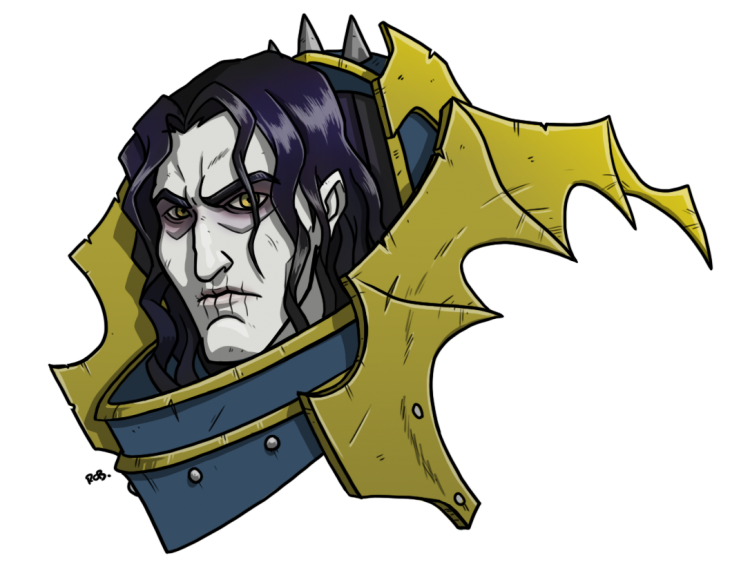
There’s a simple test with Night Lords – “Did Aaron Demski-Bowden write this?” If the answer is yes, then you should read it. If it’s not, you can skip it and be none the worse off.
Night Lords Trilogy, Aaron Demski-Bowden
Yes, ok, it’s 40k, but everyone in First Claw was around during the heresy and there’s enough flashbacks, memories and discussion of it to make even the purest 30k only fluff grog happy. Plus, it’s easily among the best things the Black Library have ever put out. If you’re a Night Lords player, I’ll bet you’ve already read this one – if you haven’t I’d be very worried about getting a visit from Talos, Xarl and Uzas when you’re trying to sleep tonight.
Savage Weapons, Aaron Demski-Bowden
You know sometimes you just want Primarch Vs Primarch and Champion Vs Champion combat? Yep, this is it. The Lion Vs the Night Haunter. Corswain Vs Sevatar. The beginning of the whole Thramas Crusade. It’s a very short story – absolutely no reason not to read this one.
Unremembered Empire, Dan Abnett
I set a test and then immediately failed it. Unremembered Empire is mainly an Ultramarines novel, but it has some top quality Curze unleashed and some absolutely insane action. If you’re following through the main narrative of the Heresy, this is an essential book – but not a fantastic one. If you hunt through the scions of Ultramar being all practical and theoretical for the explosions, corpses and panic the Night Haunter sows through Macragge though, you won’t be disappointed. For a brief moment, the Ultramarines are deeply, deeply, afraid.
World Eaters
Please see Aaron Demski-Bowden test, but bloodier and much, much sadder. ADB managed the impossible with his World Eaters books, giving us not just a tragic fall to chaos story, but a surprisingly human, relatable and even pitiable Angron. He build an actual, tragic, character out of the Primarch they called “Angry Ron” – a near-transhuman feat. Working from that into a sympathetic portrayal of Kharn the Not Yet Betrayer and the scariest of the lot, Flagship Captain Lotara Sarrin makes the berserkers some of the best and most enduring bits of the heresy.
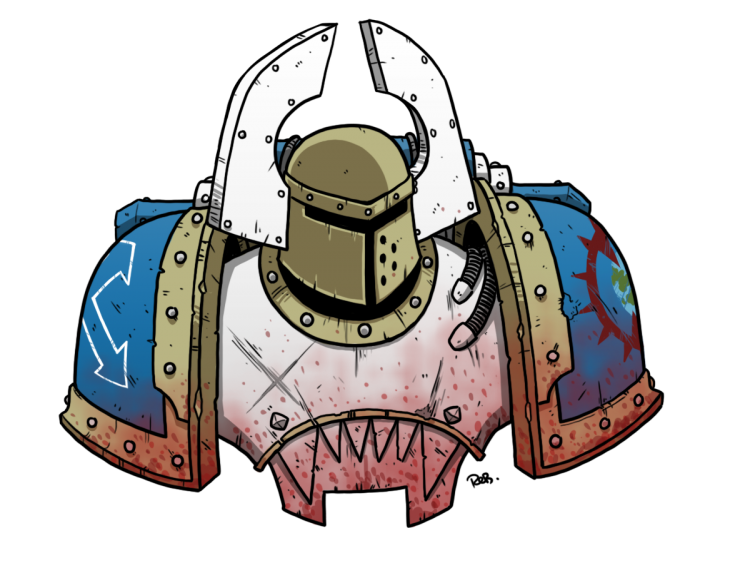
Betrayer, Aaron Demski-Bowden
If you’re just and only just looking for World Eaters, fine – but if you’re interested in the plot of the heresy generally, make sure you’ve read the First Heretic before diving into this one. For the Big Angry Lads though, this is the one – Kharn and Angron in the foreground, and in their orbit there’s a fully realised chapter with tensions, friendships, brotherhood and Lotara Sarrin. The World Eaters are human, here, but only just – slipping ever further into rage and along the path to chaos – and it’s in Betrayer that the last few shreds of sanity are cut loose.
A Rose Watered with Blood, Aaron Demski-Bowden
Thanks to Kevin Stillman for convincing me this is better than Lord of the Red Sands, because on a reread it definitely is! As the events of Betrayer start to warp the Conqueror, Lotara reckons with the consequences of Lorgar’s fuckery, Captaining a ship that is determined to gift her combat, blood and death. It’s rare that Black Library Heresy books have women in them, at all. It is rarer that they’re given anything to do other than be a surrogate mother for a Space Marine. ADB gives us Lotara as “morally compromised” – a full on villain, and it’s a great, short, pretty essential, read.
The Lost and the Damned, Guy Haley
Lost and the Damned is not the worlds best book. It’s a bit fat and could have used a serious edit, but the World Eaters bits are genuinely pretty great. Angron, having arrived in the orbit of Sol, but denied landing by the Emperor’s Aegis, has to be taken down by Kharn and Lotara, who is really feeling the consequences of hosting a daemon Primarch on her ship. Then Angron does the thing. Once Angron’s done the thing, the World Eaters bit is over and you can put the book away.
Death Guard
I feel like the Death Guard are another legion that haven’t been served that well by the Heresy books, with nothing really exceptional for them prior to the very, very end. Instead, they get scraps in other books, and the creative space for Death Guard in the Black Library seems to be eaten up by Garro, who will maybe get his own section in another article. Instead, I’d recommend the rough trilogy building from their part in Scars – the fall, and sickly resurrection, of the Death Guard.
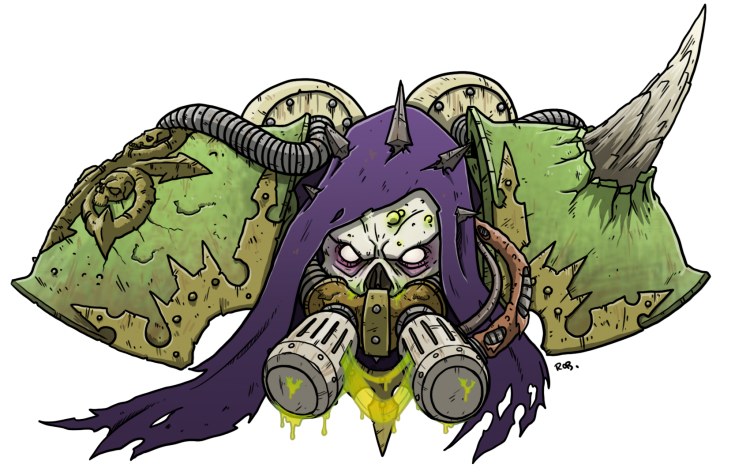
Demonology, Chris Wraight
I’d recommend Scars as a starter but there’s so little Mortarion in it you can get the TLDR here: the Khan fights Mortarion to a standstill, and goes off on one. Enter Demonology, where Mortarion arms himself with knowledge, hypocrisy and a captive Demon, then immediately starts using forbidden knowledge on the premise that “may as well, I guess”. Better than I’ve made it sound.
The Buried Dagger, James Swallow
Not a good book, but for how incredibly underserved the Death Guard are, this one is more or less a compulsory recommend. Both the origin story of the Death Guard and of the Plague Marines, as Mortarion remembers his days on Barbarus while his fleet is becalmed in the Warp and turning into…. something. It’s got to be a pretty foundational text for the Death Guard in the late Heresy and into 40k, but it’s also one of those stories where the Primarch is just so utterly outplayed by “some dude” that it rings a little hollow and unsatisfying. Mortarion’s choice at the end is there, but this is a bridge story: we know where the end has to be. Swallow takes us there.
Warhawk, Chris Wraight
The Death Guard have discovered how cute Nurglings are, and nothing will ever be the same again. Very possible that if you want to, you can believe that the Khan is the protagonist of this one, but you’d be wrong. The protagonist is the hellish transformation of the Death Guard, and their cackling, cavorting little friends. There’s a mass tank charge, an orbital plate, a million jetbike sorties, but resisting all of that is a slowly shambling mass of Plague Marines who are absolutely loving their jobs right now. Death Guard done right, because Grandfather Nurgle is our friend.
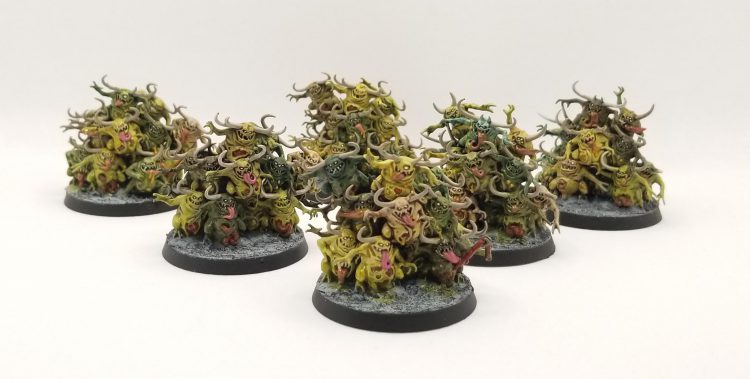
Thousand Sons
“Did Magnus do anything wrong?” is a question that’s so tired it’s barely even a meme anymore, but you’re a Thousand Sons player, you love knowledge. You can find out, more or less, for yourself. But first, you can contend with Graham McNeil’s version of events. Is he right? Is this how it all went down? Only those brave enough to search for knowledge over all else will find out.
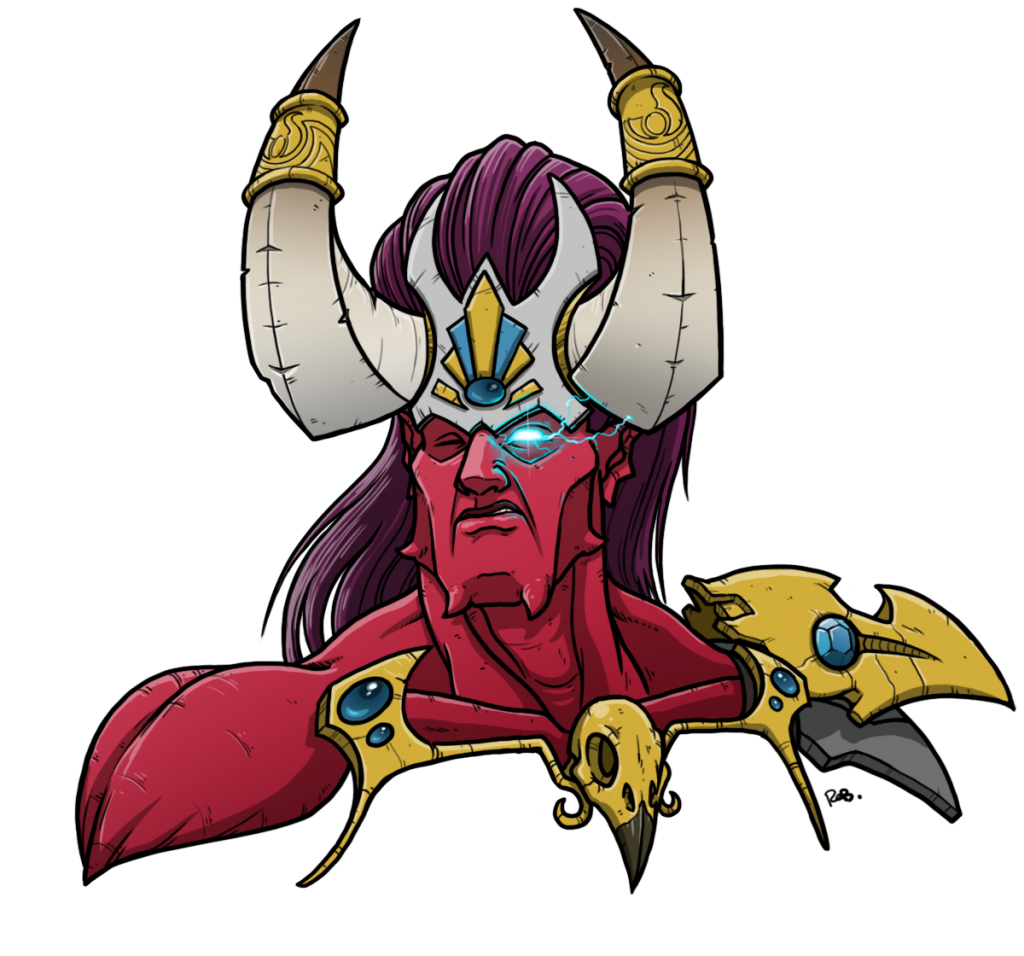
A Thousand Sons, Graham McNeil
Coming after a bit of a slump in the Heresy series, the twinned Thousand Sons and Prospero Burns (Dan Abnett) were a welcome return to form. Thousand Sons sees the, well, Thousand Sons, at their most reasonable, intelligent and considerate. They’re kind to their human hangers-on, they’re impossibly naïve with their little demon pals, and Magnus is a big red library dad. And then….. then it all goes wrong. The section when the shoe drops, when Ahriman particularly is scrabbling to hold on to the world he knew before he finally, terminally, gives up, are some of McNeil’s best bits.
The Crimson King, Graham McNeil
The rusted chains of prison moons, are shattered by the sun. I walk a road, but the horizons change – the tournament has begun. Very much a continuation to a Thousand Sons following up on how the remnant of the legion is coping, mainly becoming incredibly bitter and desperate as Magnus shatters into pieces. By the end, Ahriman is almost fully formed as the Sorcerer we know and love in 40k as he wades through the tides of the flesh change. Unfortunately it suffers in the same way as Buried Dagger does – the story needs to get somewhere, so it does.
Fury of Magnus, (guess who) Graham McNeil
Right, straight off, there’s a lot of dross in here, honestly. There’s some of Nick Kyme’s Salamander stuff that just isn’t worth reading, and there’s some shards (heh heh) of the ongoing Perpetual story of Alivia that are interesting titbits of pre-Golden Age lore. As a result, for a novella that’s about 3 hours of reading long, you’re looking at an hour of the good stuff. The good stuff is big, fat section looking straight into Magnus’s mind, and there McNeil has cornered the market and he gives us his answer as to whether Magnus did anything wrong.*
Word Bearers
Word Bearers – well, one of three Word Bearers who are all complete bastards – crop up in probably a slim majority of Heresy stories. If you’re wanting to read about Erebus, Kor Phaeron and Zardu Layak, just pick up any one of the series. One of them will probably be in there. The Word Bearers suffer from the overbearing terribleness of most of the depictions of Erebus particularly, but there’s some gems out there – mostly from the Abnett and ADB mega-brain.
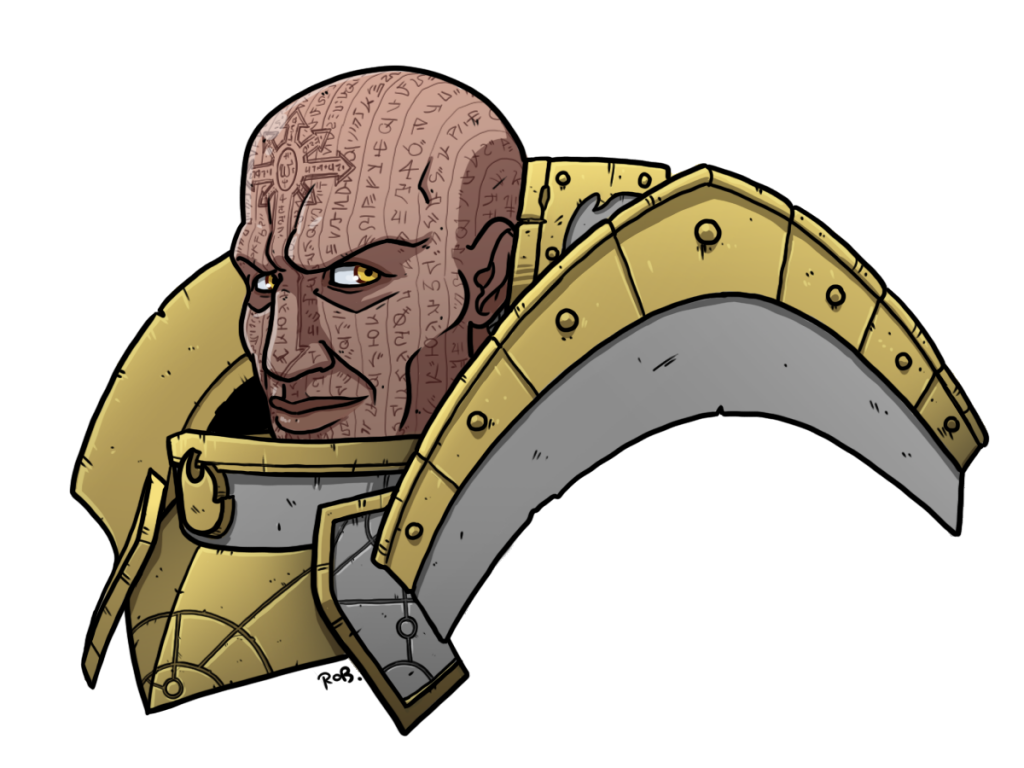
First Heretic, Aaron Demski Bowden
Lorgar, chastised, kneels in the ashes of the perfect city. When he rises, shit goes crazy. Not just a well written (except the Custodes, sorry ADB) book but one full of genuinely interesting and not-fanservicey easter eggs. Introduces us to the Good Man Argel Tal and the Scoundrel Raum, and proves, repeatedly, that Lorgar is better, cleverer and sadder, than the moustache twirling irritant, Erebus.
Know No Fear, Dan Abnett
If you only read the first half of this book, you’ll read about Word Bearers repeatedly clowning on Ultramarines with fists, swords, guns, gravity wells, daemons and cultists. For about two hundred pages, the newly red-clad Word Bearers absolutely slap the Ultramarines around in their place of power using every means at their disposal. There’s even a reason for it that makes sense in the wider war, which is a pretty unusual bit of connecting the dots for the Black Library. Inspiring for conversions, campaigns and names, as well as just being a full-on brutal slugfest of a war. The second half…. well, there’s a certain revenge aspect to it.
Betrayer, Aaron Demski Bowden
Yep I recommended it for the World Eaters too, but from a Word Bearers perspective it’s a double buddy cop drama: Argel Tal and Kharn, Lorgar and Angron. This is Lorgar the Manaical, twirling the warp around his little finger and playing it like a lute for nefarious purposes. It gives Lorgar his hero moments – and his bad-ass fighting moments – that the Primarch usually ascribes only to his brothers. I find Lorgar in both of the ADB books really sad and touching – but his actions in this one reveal him to be a fully dedicated scion of Chaos.
Alpha Legion
Last, and first, but certainly not least, or even comprehensible, there have been some great takes on the Alpha Legion (or have there?) and there have been some terrible takes on the Alpha Legion (or have there?). A lot of Alpha Legion stuff gets too stupid-convoluted, as human authors attempt to write superhuman twists. Here’s three that might say something about the Legion, and perhaps more importantly, aren’t written like this intro – but then again…..
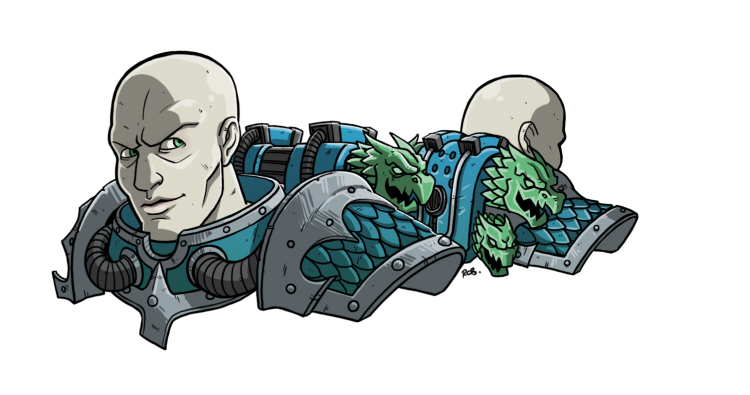
Legion, Dan Abnett
When Legion came out, some people really, really hated it. It was the first “challenging” book of the Heresy series, after a succession of perhaps not so great legion focused books. For better or worse, it’s the one where the lore bombs get dropped, where the Cabal and the Perpetuals and the Twins appear, and it’s the one with the best Imperial Army depiction in the whole series. It’s one of the few Heresy books that doesn’t just stand up to a reread but gets better each time. It’s also where “I am Alpharius” comes from, and I’d say that’s got overused and a bit tired, but you’re an Alpha Legion player, you probably whisper it in your sleep.
Praetorian of Dorn, John French
As the jaws of the trap close around Terra, the Alpha “Masters of Bullshit” Legion launch plan within plan within plan. Laugh as stoic Imperial Fists get strategically outplayed again and again, revel in cunning twists as well crafted as Monet’s wig reveal, curse when Rogal Dorn does the thing. The most important thing about this one is that it throws a billion Alpha Legion twists at you, and then laughs when you try and finally solve exactly who did what – often to the detriment of the story, but French pulls it back enough to keep it interesting.
Alpharius: Head of the Hydra, Mike Brooks
I am 100% sure that at some point in the writing of this book, Mike looked at Dan and thought “if he can flip the script, I’m going to flip the table the script is on”, because this book is bonkers. If you thought you knew anything – anything – about the Alpha Legion, or the Emperor, or the Great Crusade, you were wrong. It’s fun, as well, because for once, we’re inside Alpharius’ head (sometimes) and we get to enjoy the bullshit as it’s being done, rather than suffering it in an incredibly telegraphed twist. Whether dipping into the terrifying aliens of the Slaugth, beating up Luna Wolves or chatting to Malcador, Apharius and Omegon remain interesting, and the twists never obscure the fun of the narrative.
*Yes, He did
